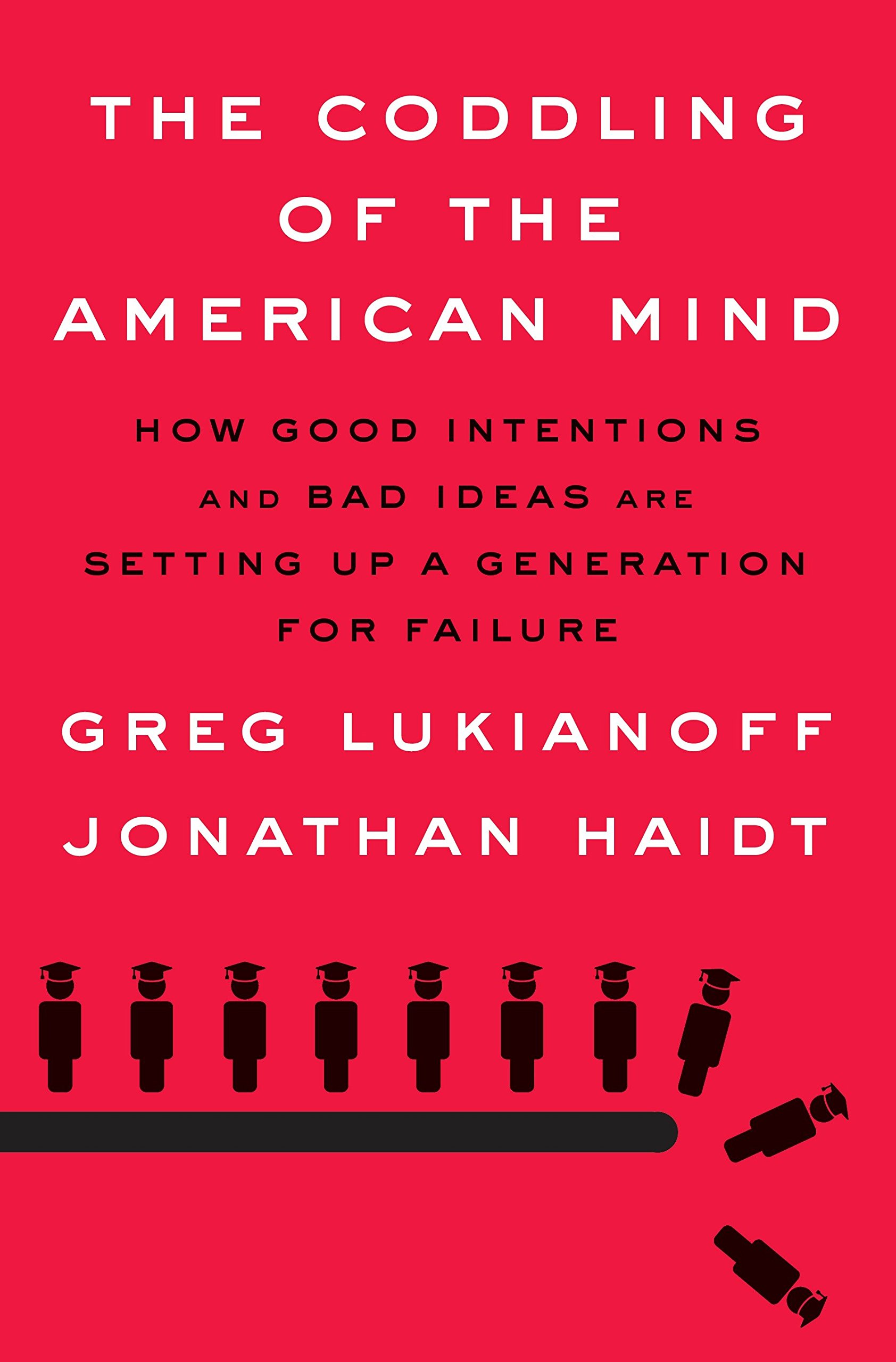The Coddling of the American Mind by Greg Lukianoff and Jonathan Haidt is, in the authors’ own words, “about wisdom and its opposite” (p. 1). Based on an article the duo originally wrote in the September 2015 edition of The Atlantic, the book focuses on three “Great Untruths” that have grown in popularity the last few years and are particularly potent on college campuses today. These three Great Untruths are:
- The Untruth of Fragility
- The Untruth of Emotional Reasoning
- The Untruth of Us Versus Them
The Coddling of the American Mind is broken into four parts: an exploration of these Great Untruths; a couple of examples of how those untruths are manifest; a in-depth look into how the Great Untruths came to prominence; and some practical advice on where to go from here. This book is full of important observations and timely applications for parents, pastors, educators, and others, despite not being a Christian volume. Let’s examine the book through the lenses of the three Great Untruths on which it is based.
1. The Untruth of Fragility
This untruth is expressed as, “What doesn’t kill you makes you weaker.”
Lukianoff and Haidt open up this section with a controversial example by examining a 2015 study on peanut allergies. In short, the study concluded that among children who were “protected” from peanuts, 17 percent developed a peanut allergy; and among students exposed to peanut products, only 3 percent developed an allergy (p. 20-21). What do the authors say this has to do with the coddling of America’s young people? A lot.
The authors cite the work of statistician and stock trader Nassim Nicholas Taleb. In his book Antifragile, Taleb breaks everything down into three basic categories: fragile, resilient, and antifragile (p. 23). A glass vase is fragile because it can be easily damaged or broken when put under stress. A plastic sippy cup is resilient because it can be thrown on the floor by a toddler every night at dinner and not be damaged. Human muscles are antifragile because resistance, challenges, and moderated stressors actually make them stronger.
Humans are meant to be antifragile beings, say Lukianoff and Haidt, and their case is strong. Their claim is that the coddling of America’s young people, or the constant pursuit of not only their physical safety, but also their mental and emotional safety, is actually doing more harm than good.
Because the Lukianoff and Haidt work on colleges campuses and because their observations are most readily seen in college students, much of the book addresses how these untruths affect those in college (or of college age). The authors ask, “Should college students interpret emotional pain as a sign that they are in danger” (p. 27)? If you pay any attention to the news, you will remember a number of recent cases of college students claiming that certain speakers holding events on their campuses could be “harmful” or “violent” simply because their views may make some students uncomfortable. This victim mentality ultimately exists because many college students today see themselves as fragile and breakable, not resilient, and most certainly not antifragile.
But what if students have genuinely endured traumatic life situations that may make certain experiences emotionally and/or mentally difficult? Shouldn’t authority figures do all they can to provide safe spaces that protect these students from harmful triggers? Lukianoff and Haidt say no. They write, “Avoiding triggers is a symptom of PTSD, not a treatment for it” (p. 29).
Later they break down the unintentional negative effects of “safetyism” which is “a culture or belief system in which safety has become a sacred value” (30). To conclude the discussion on this untruth, the authors write, “Safetyism deprives young people of the experiences that their antifragile minds need, thereby making them more fragile, anxious, and prone to seeing themselves as victims” (p. 32).
2. The Untruth of Emotional Reasoning
This untruth is expressed as, “Always trust your feelings.”
Lukianoff and Haidt begin this chapter by listing nine of the most common cognitive distortions humans express, including emotional reasoning (letting feelings determine reality), catastrophizing (focusing on the worst possible outcome), mind reading (assuming you know the thoughts of others), and other distortions commonly taught in counseling courses or those learning cognitive behavioral therapy.
Right away the authors tackle one of the most common buzzwords on college campuses (and on social media) today: “microaggressions.” In short, microaggressions are common verbal, behavioral, or otherwise social interactions that communicate bias, privilege, or other negative messages, whether intended or unintended. Some microaggressions the authors have heard before are listed: a white person calling America a “melting pot,” a white person saying “I believe the most qualified person should get the job,” and others (p. 41).
The problem with microaggressions, say Lukianoff and Haidt, is that people often unintentionally offend others simply because of their life experience, and that does not line up with the meaning of “aggression.” They write, “Aggression is not unintentional or accidental. If you bump into someone by accident and never meant any harm, it is not an act of aggression, although someone may misperceive it as one” (p. 40). That is where the phenomenon of microaggressions and The Untruth of Emotional Reasoning collide. The authors identify a shift in morals on campus—a shift from “intent” to “impact” (p. 43). What people intend has taken a back seat to how their act made someone feel, regardless of what the “aggressor” intended. The authors contend, “A faux pas does not make someone an evil person or an aggressor” (p. 44).
The best way to summarize this section is in the author’s own words, “Discomfort is not danger” (p. 51).
3. The Untruth of Us Versus Them
This untruth is expressed as, “Life is a battle between good people and evil people.”
Writing specifically about one concerning event on a college campus, Lukianoff and Haidt write, “It’s as though some of the students had their own mental prototype, a schema with two boxes to fill: victim and oppressor. Everyone is placed into one box or the other” (p. 57). Though the authors are making this statement in regard to one particular event, their observations show that it can be applied today to many college campuses and beyond.
In this section of the book, the authors break down the phenomenon of identity politics, showing that it is not a new phenomenon but acknowledging that it has evolved and has been transformed into “call-out culture” (p. 71). In such a culture, “students gain prestige for identifying small offenses committed by members of their community, and then publicly “calling out” the offenders” (p. 71). The authors continue, “One gets no points, no credit, for speaking privately and gently with an offender—in fact, that could be interpreted as colluding with the enemy. . . . This is one reason social media has been so transformative: there is always an audience eager to watch people being shamed, particularly when it is so easy for spectators to join in and pile on” (p. 71-72).
All of these untruths compound on one another like the cliché image of a snowball rolling down the hill. They build on one another and attempt to bowl over anyone who may attempt to stand in their way and recognize the problem. The authors recognize this and help their readers understand and learn how best to respond.
A brief conclusion
America’s young people are in a moral crisis, but it’s not as simple as it seems. It is not simply a moral crisis of making poor decisions. It is a moral crisis that is turning the basis of morality upside-down. In The Coddling of the American Mind, Lukianoff and Haidt provide a thorough analysis of this phenomenon, and they show their work throughout.
It is difficult to do this book justice in a brief review such as this. We didn’t even really take the time to examine all of the helpful advice Lukianoff and Haidt provide for parents, universities, and societies in general. So, the reader should know that this book is intensely practical as well.
I highly recommend this book to anyone who engages with young people in any capacity. Whether you’re a student pastor, a parent, a college administrator, or otherwise, this volume will give you a complete perspective on why America’s young people seem so fragile today. Remember, however, that this book is not a “Christian” book. So, while Lukianoff and Haidt provide sound counsel and advice throughout, it will be up to you to make connections to the truth of the Scripture and how you practice biblical parenting and ministry.
Join the ERLC in Dallas this week for The Cross-Shaped Family. This conference is designed to equip families to see that all of our family stories are shaped by the ultimate story of our lives, the gospel. Speakers include Russell Moore, Jen Wilkin, Matt Chandler, Eric Mason, Ray Ortlund, Beth Moore, Jamie Ivey, and many more. Register today to attend or find out more about our live stream option!










